Published on September 21, 2022 | Nelson Mandela Ogema, Sci Dev
| Genetic Literacy Project
According to a study published in Science [August 18], the researchers genetically modified three genes of soybeans by effectively upgrading photosynthesis – a natural process by which plants transform light into food – the modified soybeans had an increased yield of 25 per cent across five trials with one trial having up to 33 per cent increase.
Although the average yield of soybeans is about 2,760 kilograms per hectare globally, African farmers produce 1,260 kilograms per hectare, with 15 of the 24 countries in Africa for which yield data exists each having less than 1,000 kilograms per hectare, according to a 2019 article published in the African Journal of Food, Agriculture, Nutrition and Development.
Low yields of soybean motivated the implementation of the Realizing Increased Photosynthetic Efficiency (RIPE) project at the US-based University of Illinois Urbana-Champaign with the aim of genetically transforming soybeans. This resulted in the planting of new varieties in the field in 2020 and 2021.
“Although the breakthrough is very promising in Africa, its scaling up should take into account the socio-economic, political and environmental context prevailing in each country, to customise the diffusion of technology,” [agricultural research associate Frejus Ariel Sodedji] explains. “There are still many barriers – health, legal and ethical concerns – to the adoption of transgenic [GM] crops in Africa.”
Read the original post here: https://www.scidev.net/sub-saharan-africa/news/bioengineered-soybean-boosts-yields-by-a-third/

